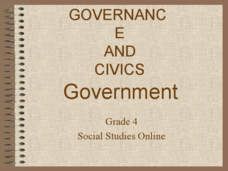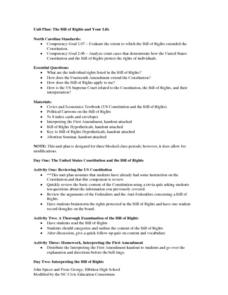iCivics
Argument Wars
From start to finish, here is a fantastic resource that uses engaging activities and an interactive virtual game to teach about major US Supreme Court cases. Your class members will distinguish the primary arguments made in such cases as...
School Improvement in Maryland
Court Proceedings Civil Cases
What's the difference between civil and criminal law? How do the court proceedings differ in these two types of trials? How do the standards of proof differ? Why do these differences exist? As part of their examination of the...
Curated OER
Governance And Civics: Grade 4
This PowerPoint provides elementary students with a basic overview of the structure and workings of the US Government. Students will be introduced to the 3 branches of Federal and State Government, the Bill of Rights, and Amendments 1,...
Teaching Tolerance
Racial Disparity in the Criminal Justice System
Explore the impact of the war on drugs in a thought-provoking lesson for high school academics. Young historians delve into the world of the criminal justice system and the racial disparity that occurs in the US. The resource provides...
Teaching Tolerance
Understanding the Prison Label
Break the chain. An engaging lesson examines why it is so hard to break free of the prison system in the US. Academics participate in a reader's theater, read primary sources, and discuss their thoughts. The lesson explains the hardships...
Curated OER
The Evolution of the Preamble
Reading and comprehending informational text is vital in all subject areas. Upper graders use primary sources and worksheets to better comprehend the historical importance of the Preamble of the US Constitution. Web links, handouts, and...
Curated OER
What are the 13th,14th, and 15th Amendments?
The 13th, 14th, and 15th Amendments are outlined in this PowerPoint. Each amendment is noted on its own slide, with a summary of its purpose and important sections of the actual document. Tip: Have students choose an amendment and write...
Curated OER
Government and Politics
After a class lesson the U.S. Constitution and its amendments, students can apply their knowledge to this activity. Several questions prompt students to add missing key terms, such as the year the Constitution was written and the number...
Curated OER
The First Amendment
In this government worksheet, students read the First Amendment to the United States Constitution before reading about the limitations of the laws. They answer 2 short answer questions about the freedoms, and write an essay on the back...
Curated OER
The Taliban Meets the Bill of Rights
Pupils contrast the Taliban and the Constitution. They read through "What the Taliban Banned" and identify "rights." They determine if rights in the United States are in danger and if the Taliban violate the first ten amendments to our ...
Curated OER
Launching the New U.S. Navy
Students analyze the U.S. Constitution for references to the creation and management of the U.S. Navy. They discuss their research and complete a worksheet and then research how the current Navy is organized.
Curated OER
A Burning Desire: A Focus Group Turns Its Attention To Old Glory
Students explore the issue of a Constitutional amendment to ban flag burning. They simulate the role of a Senator's aide, conduct Internet research, write and prepare an oral and a written response based on research,
Curated OER
Government & Politics: Chapter 11.1
In this government worksheet, students reference their textbook to answer 27 fill in the blank questions and 3 short answer questions regarding the Constitution and the powers of Congress.
Curated OER
America: Influenced by the Enlightenment
In this Enlightenment influence study guide worksheet, students read 5 quotes from the Declaration of Independence and the U.S. Constitution and then respond to 5 reflection questions.
Heritage Foundation
Lawmaking and the Rule of the Law
How many constitutional clauses does it take to create a bill? High schoolers find out with several activities and selected clauses about the rule of law and the US Constitution. Various coinciding activities help to strengthen...
Heritage Foundation
Courts and Judges
If the Supreme Court is so supreme, why do all cases not just start there? High schoolers learn why every case does not start at the Supreme Court as well as the importance of hierarchy in the US judicial system in the 11th installment...
Heritage Foundation
The Senate
Do your learners struggle to understand the differences between the Senate and the House of Representatives? Help them develop an understanding of how the US Constitution's clauses affect the Senate's operations. A high-quality...
Curated OER
The Bill of Rights and Your Life
Students review the contents of the Constitution by taking a trivia quiz and brainstorm the rights contained in the Bill of Rights. After discussing the Bill of Rights, students categorize and outline its content. Given a worksheet,...
Curated OER
Symbolic Speech
Ninth graders consider the right of freedom of speech as it is outlined in the U.S. Constitution. They receive background information for the US Supreme Court, the Bill of Rights, and free speech. They discuss a series of actual cases...
Curated OER
Bill of Rights
Students are introduced to the Bill of Rights. After their introduction, they interview adults about the rights and create a list of them in their own words. They graph the results and analyze them and share their conclusions in a...
Curated OER
Political Differences 2
A single slide provides students with a graphic organizer to fill out about political differences. Categories include state representation, The House, Missouri, and California. Tip: Save this PowerPoint to use as a template for more...
DocsTeach
Comparing the Magna Carta and English Bill of Rights with the U.S. Bill of Rights
Just how alike are some historical documents? Discover the similarities between the Magna Carta and the United States Bill of Rights in a fast-paced activity. Historians learn the importance of both documents and the lasting impact they...
Curated OER
Citizenship and the Constitution
Students identify government officials and resources on a local, state and national level. They determine the structure of local, state, and national governments.
Encyclopedia Britannica
Presidential Qualifications
Can anyone grow up to be president of the United States? As part of their study of the 2020 election, groups research the constitutional requirements to become president. The class then brainstorms a list of qualifications beyond those...
Other popular searches
- Us Constitution
- Us Constitution Amendments
- The Us Constitution
- Us Constitution Day
- Us Constitution Word Puzzles
- Us Constitution Lessons
- Amending the Us Constitution
- Us Constitution Test
- Us Constitution Projects
- Us Constitution Activity
- Forming the Us Constitution
- Us Constitution Article 1

























